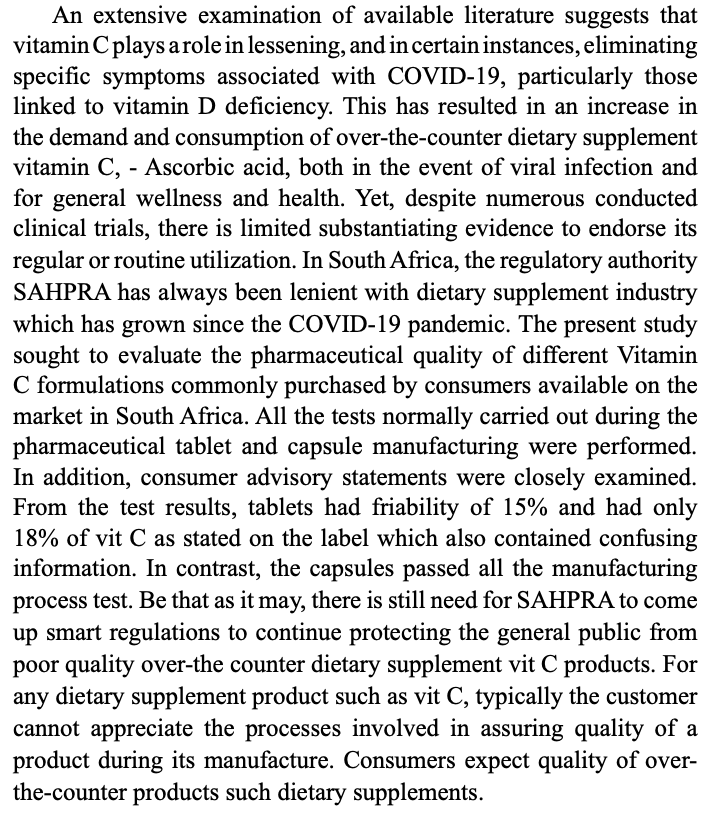
Evaluation of The Pharmaceutical Quality of the Most Commonly Purchased Vitamin C (Ascorbic Acid) Formulations in COVID-19 Infection in South Africa
et al., J. Basic Appl. Pharm. Sci., doi:10.33790/jbaps1100105, Jan 2024
Vitamin C for COVID-19
6th treatment shown to reduce risk in
September 2020, now with p = 0.000000068 from 74 studies, recognized in 22 countries.
No treatment is 100% effective. Protocols
combine treatments.
6,400+ studies for
210+ treatments. c19early.org
|
Analysis of commonly purchased vitamin C supplements in South Africa during the COVID-19 pandemic finding that vitamin C tablets failed quality tests like friability and had only 18% of the labelled vitamin C content, however vitamin C capsules passed manufacturing quality tests. Authors conclude there is a need for regulatory authorities in South Africa to develop more stringent quality guidelines and standards for over-the-counter vitamin supplements.
Chanyandura et al., 30 Jan 2024, peer-reviewed, 2 authors.
Evaluation of The Pharmaceutical Quality of the Most Commonly Purchased Vitamin C(Ascorbic Acid) Formulations in COVID-19 Infection in South Africa
doi:10.33790/jbaps1100105
An extensive examination of available literature suggests that vitamin C plays a role in lessening, and in certain instances, eliminating specific symptoms associated with COVID-19, particularly those linked to vitamin D deficiency. This has resulted in an increase in the demand and consumption of over-the-counter dietary supplement vitamin C, -Ascorbic acid, both in the event of viral infection and for general wellness and health. Yet, despite numerous conducted clinical trials, there is limited substantiating evidence to endorse its regular or routine utilization. In South Africa, the regulatory authority SAHPRA has always been lenient with dietary supplement industry which has grown since the COVID-19 pandemic. The present study sought to evaluate the pharmaceutical quality of different Vitamin C formulations commonly purchased by consumers available on the market in South Africa. All the tests normally carried out during the pharmaceutical tablet and capsule manufacturing were performed. In addition, consumer advisory statements were closely examined. From the test results, tablets had friability of 15% and had only 18% of vit C as stated on the label which also contained confusing information. In contrast, the capsules passed all the manufacturing process test. Be that as it may, there is still need for SAHPRA to come up smart regulations to continue protecting the general public from poor quality over-the counter dietary supplement vit C products. For any dietary supplement product such as vit C, typically the customer cannot appreciate the processes involved in assuring quality of a product during its manufacture. Consumers expect quality of overthe-counter products such dietary supplements.
Competing interests: The authors declare that they have no competing interests.
References
Carr, Vissers, Synthetic or food derived vitamin C 0 are they equally bioavailable, Nutrients
Chaturvedi, Garg, Rathore, Postcompression evaluation parameters for tablets-an overview, Eur J Pharm Med Res
Desai, Desai, UV spectroscopic method for determination of vitamin C (ascorbic acid) content in different fruits in South Gujarat region, Int J Environ Sci Nat Res
Hasegaw, Studies on tablet. Weight variation of compressed tablets, Pharmaceutical bulletin
Jabaley, Coopersmith, Vitamin C for patients with COVID-19: More evidence of lack of efficacy in patients with sepsis, JAMA
Jacob, Citing websites. Tablet weight variation and uniformity of weight of single dose preparations -Pharmacopeal requirements IP/BP/USP
Johnston, Luo, Comparison of the absorption and excretion of three commercially available sources of vitamin C, J Am Diet Assoc
Labuschagne, South Africa's hunger problem is turning into a major health problem, The Conversation
Lee, Jung, Lee, Han, Jo et al., Alleviation of ascorbic acid-induced gastric high acidity by calcium ascorbate in vitro and in vivo Korean, J Physiol Pharmacol
Lykkesfeldt, Tveden-Nyborg, The pharmacokinetics of vitamin C, Nutrients
Nemane, Shinde, Katu, Waghmare, A review article on: nutraceuticals, World Journal of Pharmaceutical Research
Shahbaz, Fatima, Basharat, Bibi, Yu et al., Role of vitamin C in preventing of COVID-19 infection, progression and severity, AIMS Microbiol
States, Pharmacopoeia, None, USP
Who, Corona disease (COVID-19) pandemic
Yogesh, Girish, Shailendra, UV-Spectrophotometer method for quantification of Ascorbic acid in bulk powder, The pharma Innovation Journal
